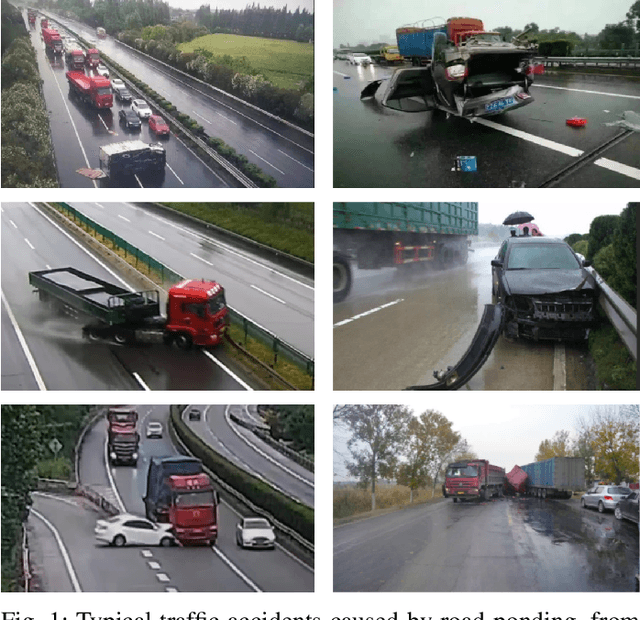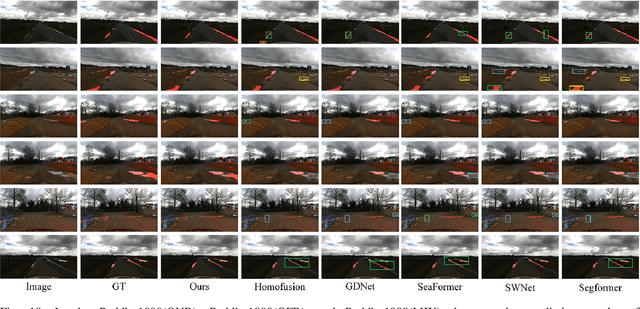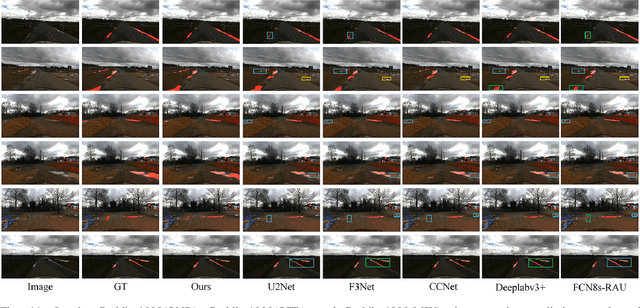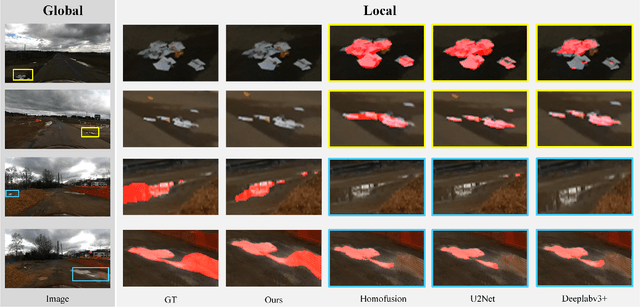Dakang Lyu
ABCDWaveNet: Advancing Robust Road Ponding Detection in Fog through Dynamic Frequency-Spatial Synergy
Apr 07, 2025Abstract:Road ponding presents a significant threat to vehicle safety, particularly in adverse fog conditions, where reliable detection remains a persistent challenge for Advanced Driver Assistance Systems (ADAS). To address this, we propose ABCDWaveNet, a novel deep learning framework leveraging Dynamic Frequency-Spatial Synergy for robust ponding detection in fog. The core of ABCDWaveNet achieves this synergy by integrating dynamic convolution for adaptive feature extraction across varying visibilities with a wavelet-based module for synergistic frequency-spatial feature enhancement, significantly improving robustness against fog interference. Building on this foundation, ABCDWaveNet captures multi-scale structural and contextual information, subsequently employing an Adaptive Attention Coupling Gate (AACG) to adaptively fuse global and local features for enhanced accuracy. To facilitate realistic evaluations under combined adverse conditions, we introduce the Foggy Low-Light Puddle dataset. Extensive experiments demonstrate that ABCDWaveNet establishes new state-of-the-art performance, achieving significant Intersection over Union (IoU) gains of 3.51%, 1.75%, and 1.03% on the Foggy-Puddle, Puddle-1000, and our Foggy Low-Light Puddle datasets, respectively. Furthermore, its processing speed of 25.48 FPS on an NVIDIA Jetson AGX Orin confirms its suitability for ADAS deployment. These findings underscore the effectiveness of the proposed Dynamic Frequency-Spatial Synergy within ABCDWaveNet, offering valuable insights for developing proactive road safety solutions capable of operating reliably in challenging weather conditions.
AGSENet: A Robust Road Ponding Detection Method for Proactive Traffic Safety
Oct 22, 2024



Abstract:Road ponding, a prevalent traffic hazard, poses a serious threat to road safety by causing vehicles to lose control and leading to accidents ranging from minor fender benders to severe collisions. Existing technologies struggle to accurately identify road ponding due to complex road textures and variable ponding coloration influenced by reflection characteristics. To address this challenge, we propose a novel approach called Self-Attention-based Global Saliency-Enhanced Network (AGSENet) for proactive road ponding detection and traffic safety improvement. AGSENet incorporates saliency detection techniques through the Channel Saliency Information Focus (CSIF) and Spatial Saliency Information Enhancement (SSIE) modules. The CSIF module, integrated into the encoder, employs self-attention to highlight similar features by fusing spatial and channel information. The SSIE module, embedded in the decoder, refines edge features and reduces noise by leveraging correlations across different feature levels. To ensure accurate and reliable evaluation, we corrected significant mislabeling and missing annotations in the Puddle-1000 dataset. Additionally, we constructed the Foggy-Puddle and Night-Puddle datasets for road ponding detection in low-light and foggy conditions, respectively. Experimental results demonstrate that AGSENet outperforms existing methods, achieving IoU improvements of 2.03\%, 0.62\%, and 1.06\% on the Puddle-1000, Foggy-Puddle, and Night-Puddle datasets, respectively, setting a new state-of-the-art in this field. Finally, we verified the algorithm's reliability on edge computing devices. This work provides a valuable reference for proactive warning research in road traffic safety.
 Add to Chrome
Add to Chrome Add to Firefox
Add to Firefox Add to Edge
Add to Edge